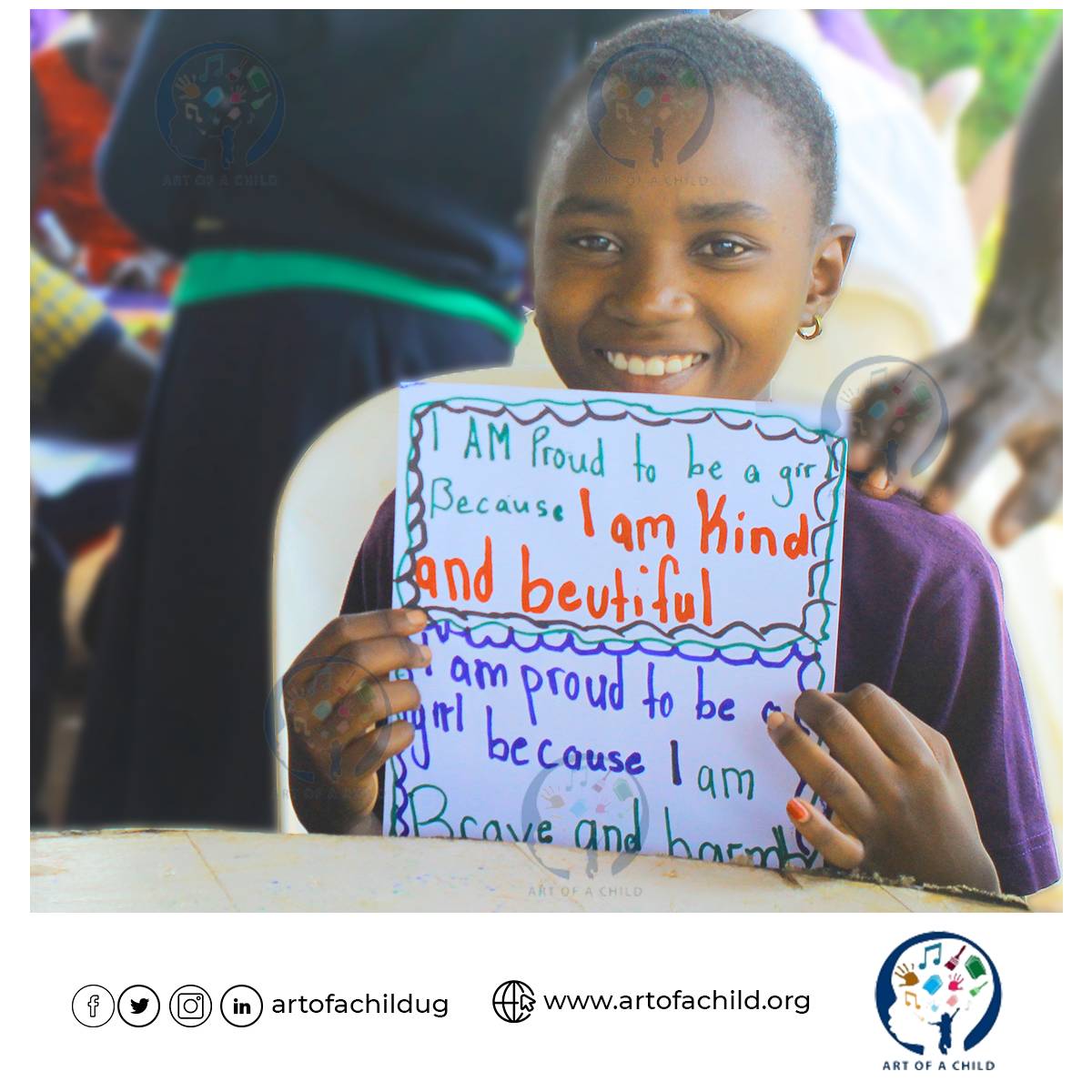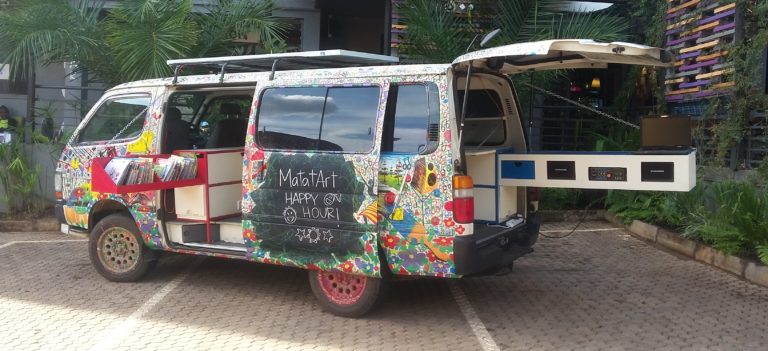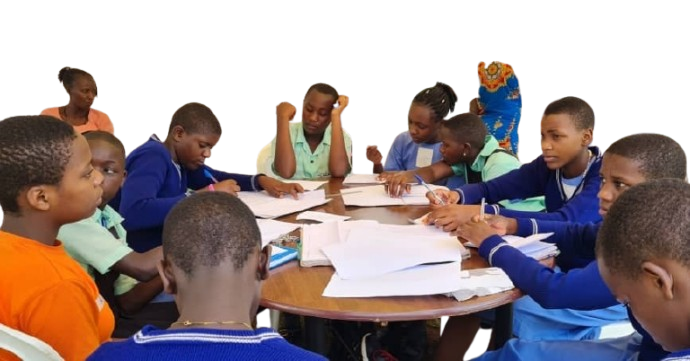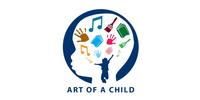
Innovative & comprehensive programming
At Art of a Child, we execute various programs and services following S.L.A.S.H//G Programming. Under each of these domains are other programs as described below.
- SCIENCE:

Tech and Play Bus: Is a mobile all-in-one structure that delivers tech, literature and art resources to children’s doorsteps even in places where there is little infrastructure, equipment, services or facilities. Our bespoke vehicle transforms any space making it suitable for learning among out-of-school children.
2. LITERACY:

LitTotos:
70% of Uganda’s 3.6 million children between 3 and 5 years enter primary school unprepared to learn. About 80% of children aged 3-5 in Uganda do not have access to Early Childhood Care and Education a key component of Early Childhood Development.
LitTotos is an Art of a Child program developed for children aged 3 to 5 in order for them to have a joyful start to their learning journeys.
LitClubs:
An in-depth literacy and empowerment program run once a week.
These clubs serve as nurturing environments for joyful learning, creative self-expression, and community cohesion, specifically tailored for children aged 8 to 15. LitClubs have reached a significant milestone, impacting the lives of 3,815 children and community mothers by 2024. Through this initiative, we strive to foster a love for learning, empower individuals, and build stronger, more resilient communities.
Regional Literacy Camps:
and build on Children’s strengths in order to help them reach their full potential as engaged literacy learners who embrace the power of their own voices.
LitMoms:
LitMoms Clubs provide caretakers in communities with the tools they need to support themselves and their families.
By giving mothers access to entrepreneurial training, literacy empowerment, and social support that so many women are often denied, helps women become leaders in both their homes and communities—creating change for generations to come.
P-LEARN Educators:
Supporting educators in low-served schools with the tools and training they need incorporate play, expressive art therapy, project-based learning as techniques to enhance quality education.
3. ARTS:
Music for life skills:
Using music as a powerful tool to teach out of school teenagers with skills such as Work readiness, Confidence, Hope, Resilience, Problem solving, communication, team work, perseverance and leadership skills.
Spoken Word Summit:
Empowering young people in schools to advocate for change of policies through the art of spoken word. Poetry clinics are run in schools throughout the term and then all the young poets come together for one big spoken word summit where they involve in panel discussions, poetry coemptions and awards given to winner in various categories.
4. SPORTS:
Girls Kicking it Tournament:
A football tournament serving approximately rural girls and ensuring girls are not left out of sports activities, the tournament serves girls’ communities and schools in rural Masaka. 5 Girls’ Football clubs created so far our goal is 10 just because: Absolutely, girls should play football! Engaging in sports like football offers numerous benefits, including: Physical Health: Football promotes cardiovascular fitness, strength, and coordination. Mental Health: Participation in sports can improve self-esteem, reduce stress, and foster a sense of belonging.
Wolfgang Football Academy:
General support to boys aged 6 to 15 in rural Masaka with dreams of becoming football stars through quality education, character development and the skills to perfect their art of football.
5. HEALTH & WELLNESS
Meal up:
A feeding program designed to supplement school diets and improve the nutrition of children at our centers. By providing nutritious meals, we aim to address food insecurity and support the overall health and well-being of the children we serve. This program has a direct impact on the physical health, cognitive development, and academic performance of the children, ensuring they have the energy and nutrients needed to thrive in school and beyond. Additionally, it contributes to creating a conducive learning environment by reducing hunger-related barriers to education.
Healthy Boys=Healthy Girls:
HBHG focuses on sexual, reproductive, and emotional health with strong emphasis on healthy relationships. Health issues can be enormous—and sometimes overwhelming—barriers for teens all over the world. Lack of access to sexual and reproductive health information and care can prevent teens from attending school regularly—impacting not just their ability to be at their best physically, but also their ability to learn, grow, and receive necessary educational and social support at a crucial time in their lives.
Girls for school pads:
An initiative create alongside literacy club members of 2019 with a focus on reducing period poverty among school going girls, reducing their dropout rate from school and reducing period stigma in schools/ communities.
6. GENDER EQUITY:
Girl Boss:
This program introduces girls to the basic principles of entrepreneurship, and teaches the need-to-know life and work skills of the 21st century, such as: Creativity & Innovation, Problem-Solving, Critical thinking, Digital proficiency, Communication & Collaboration, Self-determined Independence, Opportunity Identification and Resilience.
The girls also get hands-on skilling in male dominated professions such as electrical wiring, tiling, building and construction, car mechanics, house painting so that girls can have equal chances at employment in the above mentioned fields.
OTHERS
I. Community Learning Centers:
We have constructed 2 Community Learning Centres (CLCs) in the rural areas of Kabarole and Wakiso Districts.
CLCs play a vital role in providing functional literacy, vocational skills, and work-related skills to marginalized youth and children in the community particularly for those who can’t continue to learn in the formal education system.
These centers provide structured activities and materials that allow students to hone their skills in a supportive and interactive environment. Working with peers gives students the opportunity to approach someone they are comfortable with and ask for help. Students can develop leadership skills as they help peers and guide instruction in their groups.
II. Advocacy Days:
Art of a Child actively engages in educational advocacy events, including World Read Aloud Day, Black History Month, Menstrual Hygiene Day, and the International Day of the Girl.
These initiatives serve as platforms to raise awareness about important educational issues, promote literacy, celebrate diversity, advocate for menstrual hygiene, and empower girls. Through its participation, Art of a Child contributes to shaping public discourse, fostering inclusivity, and advocating for policies that advance educational equity and opportunities for all.
